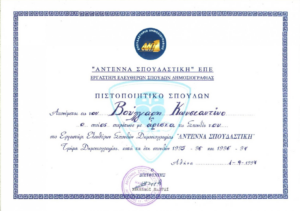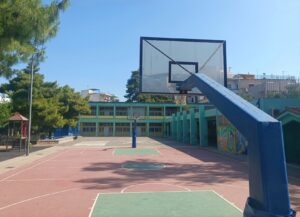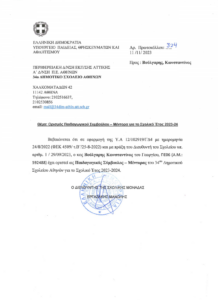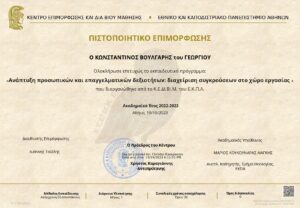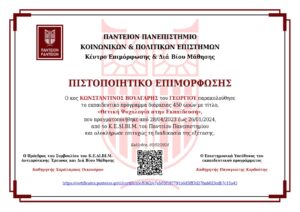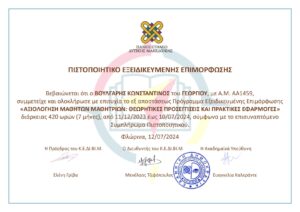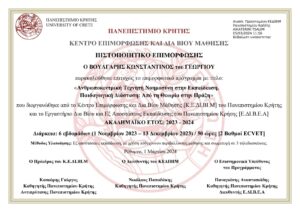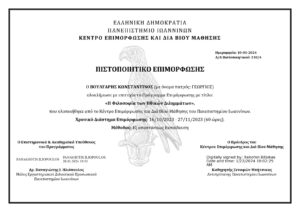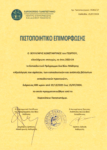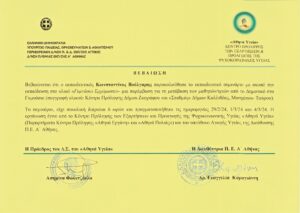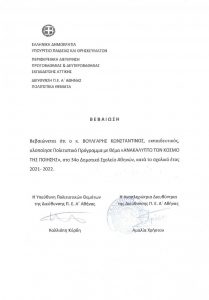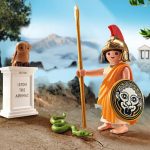Ancient Greece was a civilisation in the north- eastern Mediterranean, existing from the Greek Dark Ages (12th–9th centuries BC) to the end of classical antiquity. The period from the death of Alexander the Great in 323 BC to the death of Cleopatra, the last Macedonian ruler of Egypt, is known as the Hellenistic period. In… (συνέχεια…)
Άρθρα με ετικέτα ‘Αρχαιότητα’
The Legacy of Ancient Greece
Συντάκτης: Κων/νος Βούλγαρης | Κάτω από: Εκπαίδευση στον 21ο αιώναLearning about Ancient Greece
Συντάκτης: Κων/νος Βούλγαρης | Κάτω από: Εκπαίδευση στον 21ο αιώναΤα λόγια του Andrew από τη σελ. 14 του Βιβλίου Μαθητή της Δ′ τάξης, ελαφρώς παραλλαγμένα: Hello! It’s me, Andrew, again! Here’s our timetable for this year. My favourite days are Tuesday and Wednesday because we’ve got History, which happens to be my favourite school subject. I love it because we learn about ancient Greece…. (συνέχεια…)
The Phrygian cap is a soft, conical hat with the top pulled forward. Its origins trace back to ancient Phrygia, a region in Asia Minor. By the 4th century BC (early Hellenistic period), the Phrygian cap was associated with Attis, the consort of Cybele, the cult of which had by then become… (συνέχεια…)
Why Are You So Scary, Mr Minotaur?
Συντάκτης: Κων/νος Βούλγαρης | Κάτω από: Εκπαίδευση στον 21ο αιώναΜαζί με τον παρακάτω μονόλογο και το ερωτηματολόγιο, δείτε και την άσκηση 4, σελ. 78, στο βιβλίο εργασιών Magic Book 2 (A1 Level Activity Book) της Γ′ τάξης. Hello, I’m the Minotaur! I’m a big, scary monster. I look like a mix of a bull and a man. Imagine a big bull with a… (συνέχεια…)
Όψεις της ζωής των γυναικών στην αρχαία Αθήνα και Σπάρτη
Συντάκτης: Κων/νος Βούλγαρης | Κάτω από: Εκπαίδευση στον 21ο αιώνα
Away from the Expectations of Others
Συντάκτης: Κων/νος Βούλγαρης | Κάτω από: Εκπαίδευση στον 21ο αιώναΣτη σελ. 34 του βιβλίου Pupil’s Book της ΣΤ’ τάξης βρίσκουμε μία δια- σκευή του έργου A Midsummer Night’s Dream του William Shakespeare. Βασισμένος στο κείμενο αυτό, ανέπτυξα τους ρόλους με Τεχνητή Νοημοσύνη. Πρόσθεσα και μερικούς ακόμη. Τα παιδιά θα επιλέξουν τα λόγια που θέλουν να μάθουν για τη θεατρική μας παράσταση. … (συνέχεια…)
Σελ. 50 στο βιβλίο Pupil’s Book της ΣΤ’ τάξης Διασκευή του κειμένου Το τραγούδι των Beatles που άκουγε η γιαγιά της Αναστασίας
Ένα κείμενο από τη σελ. 26 του βιβλίου Pupil’s Book της ΣΤ’ τάξης
Ένα κείμενο από τη σελ. 46 του βιβλίου Pupil’s Book της ΣΤ’ τάξης However, the artwork you see is not the one by Pieter Brueghel; it has been generated by Artificial Intelligence.
Ένα κείμενο από τη σελ. 19 του βιβλίου Pupil’s Workbook της ΣΤ’ τάξης
Από τον αρχαίο Κεραμεικό στην Ακαδημία Πλάτωνος
Συντάκτης: Κων/νος Βούλγαρης | Κάτω από: Εκπαίδευση στον 21ο αιώναΠεριπατητικό σεμινάριο Η διαδρομή βασίστηκε στην οπτικοακουστική εφαρμογή Walk to Plato’s Academy. Ακολουθήσαμε τα βήματα αρχαίων φιλοσόφων και περιηγητών.
Nike lehrt den Knaben Heldensagen
Συντάκτης: Κων/νος Βούλγαρης | Κάτω από: Εκπαίδευση στον 21ο αιώναΗ Νίκη μαθαίνει στο αγόρι τα έπη των ηρώων Μαρμάρινο γλυπτό του Emil Wolff (1847), τοποθετημένο στη γέφυρα Schlossbrücke στο Βερολίνο. Η Νίκη κρατά ασπίδα με τα ονόματα ΑΛΕΞΑΝΔΡΟΣ, ΚΑΙΣΑΡ, ΦΡΕΙΔΕΡΙΚΟΣ. Nike Instructs the Boy in Heroic History is an outdoor marble sculpture by Emil Wolff (1847), installed on Schlossbrücke in Berlin, Germany. Nike holds… (συνέχεια…)
Έφτασαν στο δημοτικό σχολείο Sprankel της βελγικής πόλης Roeselare (Ρούσελαρε) τα γράμματα των μαθητριών και μαθητών μου της Ε’ τάξης, μαζί με τις εργασίες που κάναμε στο μάθημα των Αγγλικών, οι οποίες είχαν ως θέμα —μεταξύ άλλων— το Μέγα Αλέξανδρο, τον Οιδίποδα Τύραννο, τον William Shakespeare και την Anne Boleyn. … (συνέχεια…)
Doing the Right Thing with the Parthenon Marbles
Συντάκτης: Κων/νος Βούλγαρης | Κάτω από: Εκπαίδευση στον 21ο αιώναBY VICTORIA HISLOP | AUG 08, 2022 The UK newspapers have all been buzzing this week with the suggestion that the British Museum may be ready to discuss the return of the Parthenon Sculptures with Greece. This all arose after the new chairman of the BM Trustees, George Osborne, said that there is a “deal to be… (συνέχεια…)
A Neolithic Clay Figurine from Chaeronea
Συντάκτης: Κων/νος Βούλγαρης | Κάτω από: Εκπαίδευση στον 21ο αιώναArchaeological Museum of Thebes, Greece The 6th millennium BC spanned the years 6000 BC to 5001 BC. It is impossible to precisely date events that happened around the time of this millennium and all dates mentioned are estimates mostly based on geological and anthropological analysis. The only exceptions are the felling dates for some… (συνέχεια…)
39th Athens Marathon Opening Ceremony
Συντάκτης: Κων/νος Βούλγαρης | Κάτω από: Εκπαίδευση στον 21ο αιώναThe official website
Robert Creeley (1926–2005) was a poet born in Arlington, Massachusetts. He grew up in Acton. At the age of two, he lost his left eye. In his later years he was an advocate of, and a mentor to, many younger poets, as well as to others outside of the poetry world. Kore… (συνέχεια…)
William Bronk (1918-1999) was a poet from Fort Edward, New York. For his book, Life Supports (1981), he won the National Book Award for Poetry. The Smile on the Face of a Kouros This boy, of course, was dead, whatever that might mean. And nobly dead. I think we should feel he was nobly… (συνέχεια…)
Iphigenia (Greek: Ιφιγένεια) is a 1977 Greek film directed by Michael Cacoyannis, based on the Greek myth of Iphigenia, the daughter of Agamemnon and Clytemnestra, who was ordered by the goddess Artemis to be sacrificed. Cacoyannis adapted the film—the third in his “Greek tragedy” trilogy after the release of Electra in 1962 and The… (συνέχεια…)
Carolyn Kizer (1925–2014) was an American poet from Spokane, Washington. Her works reached into mythology, politics, and feminism. She won the Pulitzer Prize in 1985. The Ungrateful Garden Midas watched the golden crust That formed over his steaming sores, Hugged his agues, loved his lust, But damned to hell the out-of-doors Where blazing motes… (συνέχεια…)





